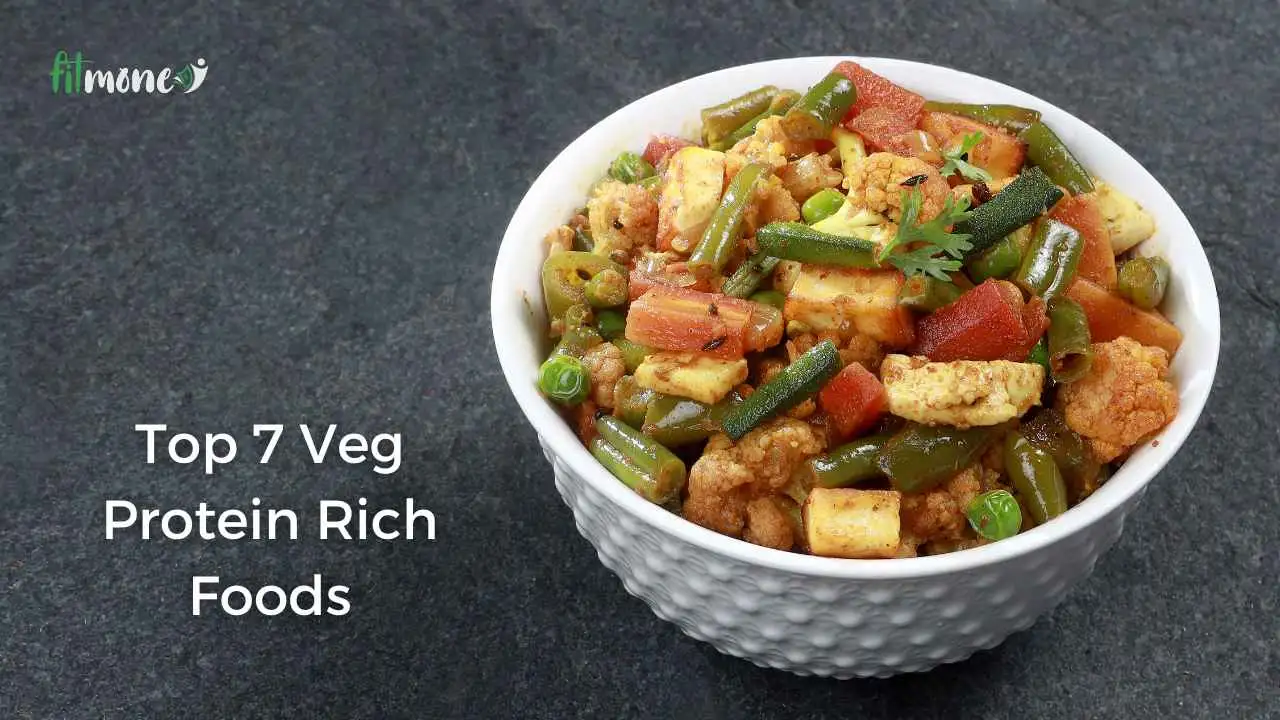In this article, I am sharing information about the top protein rich foods that help build muscle and improve overall health in this article.
What are Proteins?
Protein is a vital macronutrient for our body. Proteins are made of amino acids. Amino acids are building blocks of protein, and there are 20 types of amino acids. Protein is essential because it helps in muscle building and overall health.
It helps repair muscle tissues, provides skin and hair benefits, and gives a feeling of satiety. Those who sweat out and workout require a good amount of protein. All these benefits of protein are from amino acids. Amino acids are of two types:
- Essential Amino Acids: These amino acids are necessary because the body cannot produce these acids independently. That is why getting essential amino acids from your diet is crucial. Essential amino acids are Histidine, Valine, leucine, Isoleucine, Lysine, Methionine, and Tryptophan.
- Non-Essential Amino Acids: These amino acids are not necessary in your diet because the body produces them by itself. Non-essential amino acids are Alanine, Aspartic Acid, Asparagine, Glutamine, Glycine, Proline, Serine and Tyrosine.
When you consume Protein, 90% of protein breaks down into amino acids used by the body to build muscles, repair muscles, and form tissue structure.
Amino Acids have no storage like the body stores fat. That is why it is vital to fulfil daily protein requirements.
Benefits of Protein Intake
- It is essential for building and repairing muscle fibers after exercise.
- It helps build antibodies for the immune system.
- It aids in the digestion and absorption of food.
- It transports oxygen to tissues.
- It builds Muscles, Ligaments, Organs, Hair & Skin structure.
According to modern science, a person who never workout regularly also needs 50-60 grams of protein daily. If your goal is muscle building, then you need more protein.
An average person also needs 0.8 grams of protein per kg of body weight. Those involved in athletic activities and regularly exercise need 1.2 – 2.0 grams of protein per kg of body weight.
Protein is most important for increasing muscle mass and muscle repair. It boosts metabolism and helps burn fat fast.
It is the most filling macronutrient that reduces cravings. Eating adequate protein helps in glowing skin & strong hair and lowers the risk of arthritis.
What makes a Good Protein Source?
However, getting enough should not be your only priority; it is also vital to consider the sources you are getting your protein from, as you want to ensure they are high-quality sources.
Using high-quality protein sources or protein rich foods enables you to maximize muscle growth and optimize your recovery & performance.
Generally, two main factors determine the quality of a protein source:
- Leucine Content
- Digestibility
Leucine is an amino acid shown in many studies. It is the most potent amino acid for stimulating muscle protein synthesis and digestibility.
Higher Leucine Content and Digestibility of a protein source leads to better muscle repair and growth.
Veg Protein Rich Foods
Many people think vegetarian protein can’t give you enough protein, but this doesn’t seem right.
Vegetarian foods have very healthy protein, and they help in bodybuilding, muscle strength and growth. Here is the list of top 7 protein rich foods for health and Muscle Building.
1. Sprouts
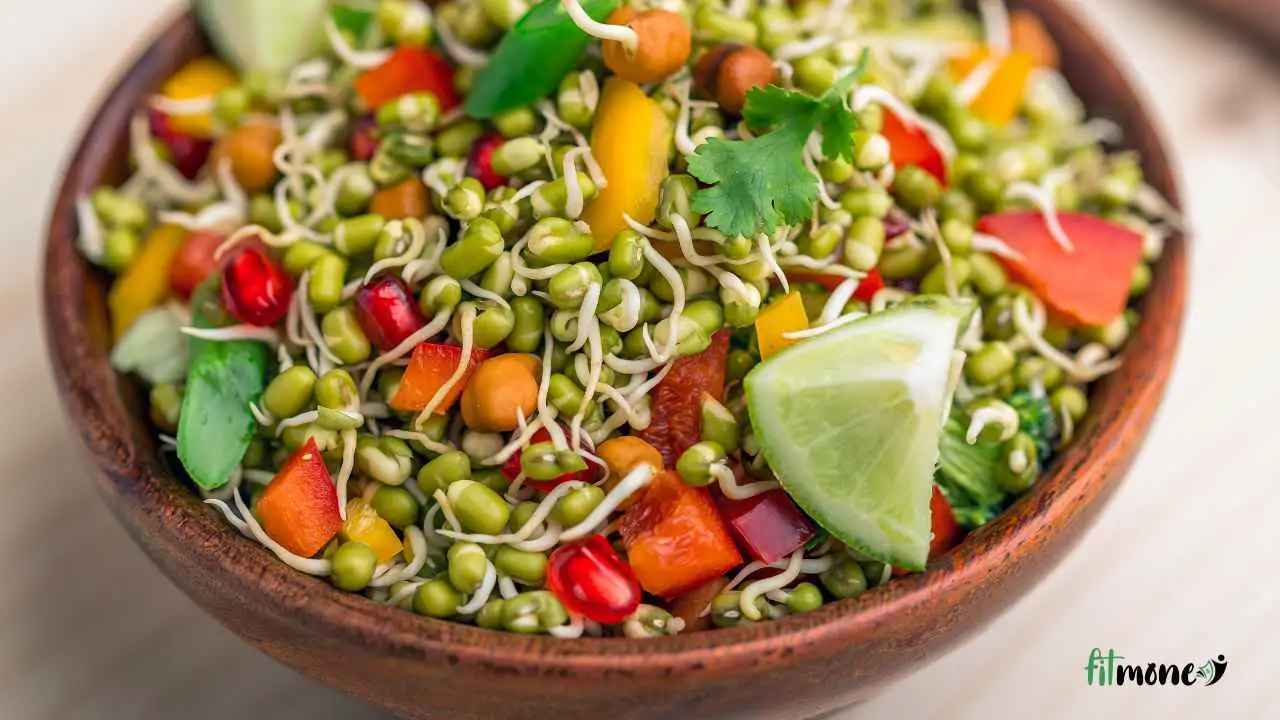
Sprouts are seeds that are germinated, and they become young plants. These are highly nutritious, especially in protein.
You can eat a variety of sprouts like mung bean sprouts, pea sprouts, lentil sprouts, chickpea sprouts, sunflower sprouts, etc., which can provide high-quality protein.
How to make protein rich foods Sprouts very easily?
The easiest way to make sprouts is by steam cooking and having it directly with a little bit of salt & black pepper. You can even make dishes by mixing them with vegetables and making them into a mixed vegetable recipe.
Another way is to make Hummus. Hummus is made of chickpeas, mashed boiled chickpeas with garlic, lemon juice, and oil.
Put it in the grinder and mash it completely; this paste would become an excellent source of protein, and this paste could be taken as it is with roti with bread or anything else.
Watch Video on Health Benefits of Protein rich foods Sprouts
Check Out:
Protein Rich Foods Sprouts Nutrition per 100 gram
| Nutrient | Amount |
| Protein | 7.7 gram |
| Dietary Fibre | 1.9 gram |
| Carbohydrates | 6.2 gram |
| Omega 3 Fatty Acids | 16.6 mg |
| Omega 6 Fatty Acids | 43.7 mg |
| Calories in One Cup Sprouts Approx. | 255 calories |
Sprouts are healthy & nutritious because of their activated enzymes and high protein content. They are rich in antioxidants and protect the body from the damage caused by free radicals.
2. Roasted Chickpeas
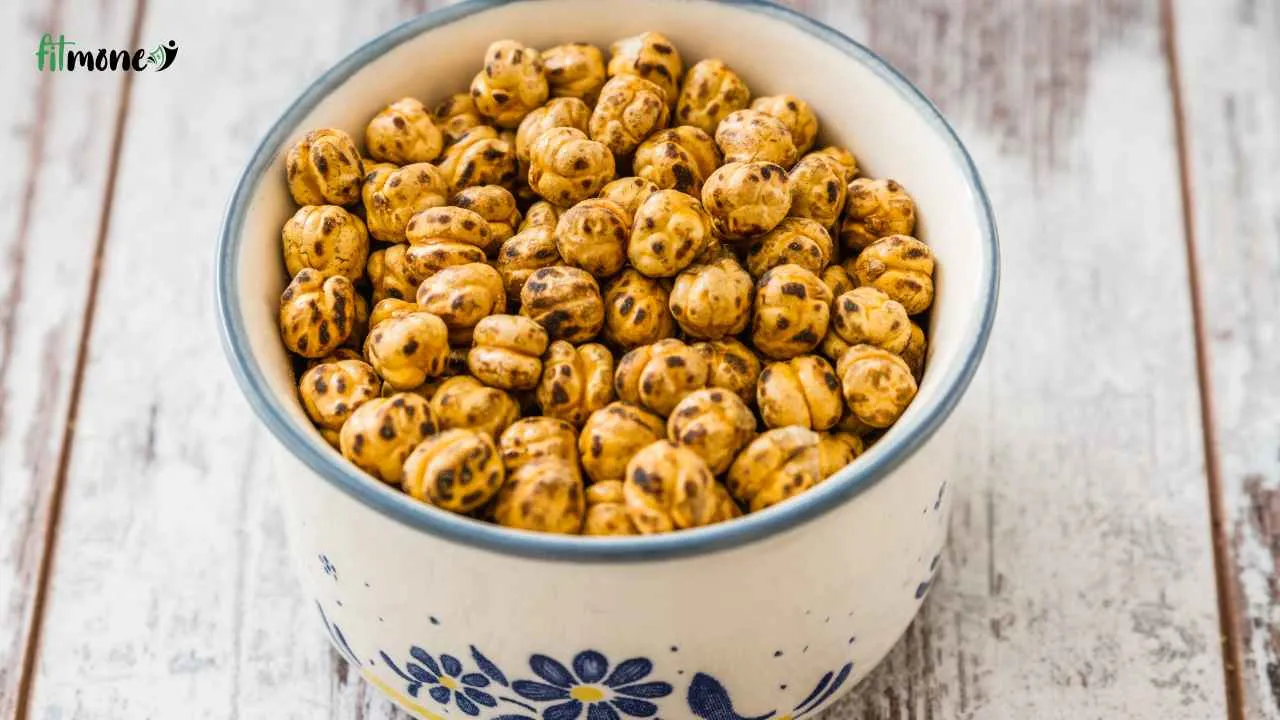
Roasted Chickpeas are a great protein rich foods option for daily protein requirements.
100 grams Roasted Channa = 21.43 grams Protein
Roasted chickpeas are free from anti-nutrients that hinder the absorption of protein. Even modern studies recognize that the protein quality in chickpeas is better than the other plant proteins.
Many Wrestlers and fitness enthusiasts consume this food daily. Spice it up with onion, tomato, cucumber, and rock salt to increase its taste and make a chaat.
Consume roasted chickpeas with the skin to get its maximum fibre benefits. One hundred grams of roasted chickpeas has nearly 18 grams of fibre.
Protein rich foods Powered roasted chickpeas are called “Sattu”. Sattu is a famous drink in India known for its easy protein absorption. One scoop of Sattu (30 grams) has 7 grams of Protein.
It also has nutrients like iron, calcium, magnesium and folate. You can also use Sattu in the Paranthas, prepare chilas from it, or make its refreshing drink.
Benefits of eating Chickpeas with Jaggery
Check Out:
- Vedaka Roasted Chana protein rich foods
- Roasted Chana Without Skin protein rich foods
- Sattu Powder protein rich foods
Chickpeas are 100% natural ingredients and low in glycemic index. Chickpeas (Sattu) Powder is a natural protein powder for Muscle Building and Health.
Protein Rich Foods Chickpeas Nutrition per 100 gram
| Nutrient | Amount |
| Energy | 429 Calories |
| Protein | 21.43 gram |
| Carbohydrates | 64 gram |
| Fat | 11 gram |
| Fibre | 18 gram |
3. Paneer
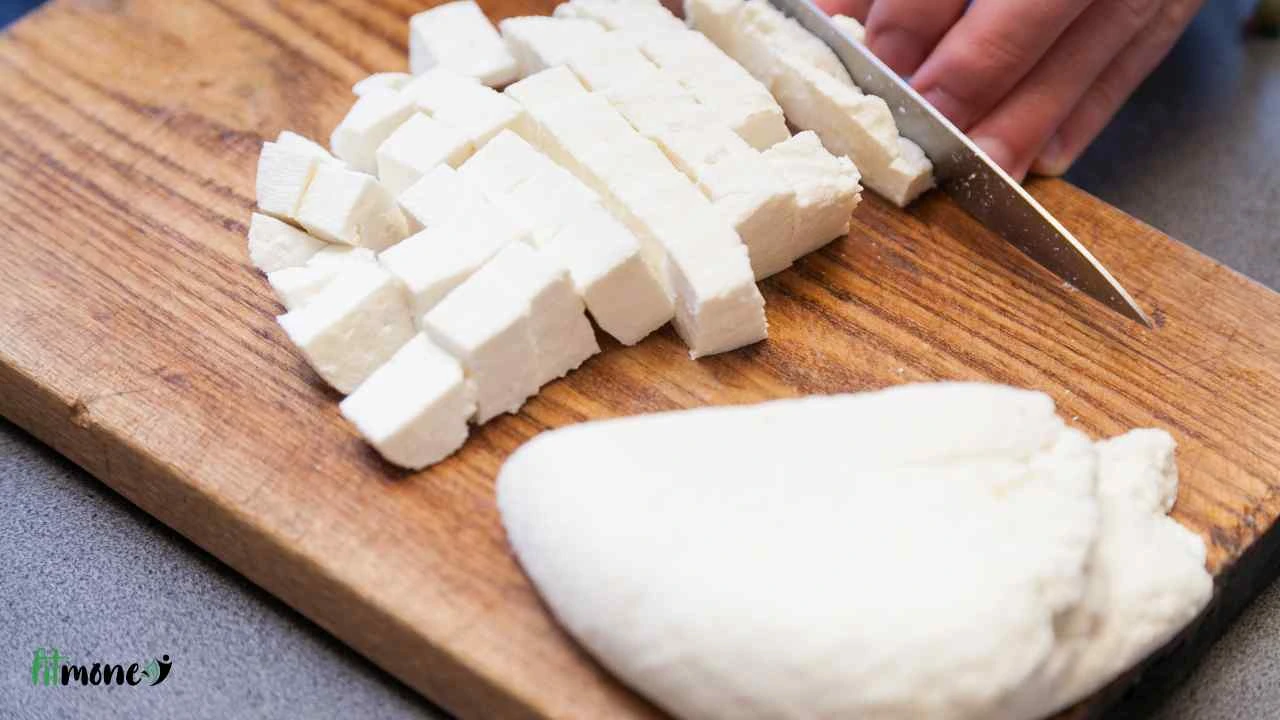
Paneer, also called Cottage Cheese, is an excellent source of high-quality protein. Many fitness enthusiasts consume it daily in their post-workout meals, as it helps fulfil protein requirements.
You can use roasted paneer or can have it with vegetables to enhance its taste. It can be an excellent addition to your muscle-building and weight-loss diet. Paneer is rich in calcium and is suitable for bone & teeth health.
100 grams of Protein = 18 grams of Protein and 20 grams of Fat
You can eat low-fat milk paneer if you do not want its fat content. Low Fat Paneer can be prepared at home. Companies selling whey protein use paneer water as their primary raw material for preparing it.
Protein aids in the synthesis of muscle tissue and helps muscles recover after exercise.
Paneer contains healthy fats, including omega-3 fatty acids, which have anti-inflammatory properties and may help support muscle growth and development.
Due to its high protein and fat content, paneer can help you feel full. You’ll feel happy and satisfied longer, which can prevent overeating and support muscle-building goals.
It is important to remember that cottage cheese, as part of a healthy diet and with regular meals, can be beneficial for muscles & health. Still, it should be consumed in moderation, especially by those who pay attention to their calorie intake and those who suffer from high cholesterol or heart problems.
Additionally, choosing low-fat cheese or adding other lean meat sources with paneer can help maintain a healthy body.
Watch video on Tofu vs Paneer (Cottage Cheese)?
Check Out:
Protein Rich Foods Paneer Nutrition per 100 gram
| Nutrient | Amount |
| Energy | 265 Calories |
| Protein | 18 gram |
| Carbohydrates | 1.2 gram |
| Fat | 20 gram |
| Calcium | 208 mg |
4. Milk
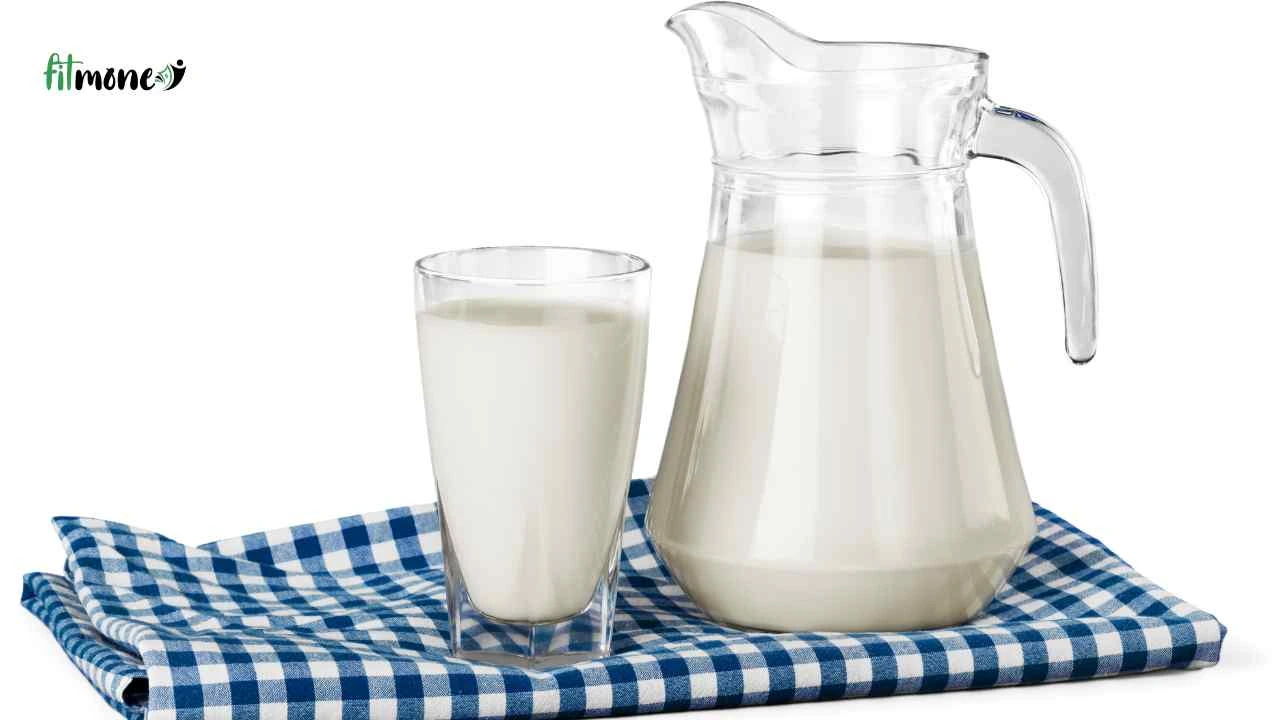
Milk is one of the best sources of quality protein. Just one glass of milk (250 ml) will give you 10 grams of Protein. Milk is rich in vitamin D, vitamin b12, Conjugated Linoleic Acid (CLA) and Omega-3 fatty acids; that is why it is also considered a vegetarian alternative to non-vegetarian foods.
A shake prepared with a glass of milk, two bananas and dry fruits can be your desi post-workout shake. Several studies have demonstrated that drinking milk after a workout can reduce muscle soreness & fatigue and increase strength & muscle repair.
Protein rich foods Milk has all the essential nutrients that the human body needs. It provides unique nutrients no other food can provide. Milk is a versatile option; you can prepare curd or paneer from it for additional benefits.
Milk helps in building lean muscle mass and overall body composition. Low-fat milk is an excellent option to include in your diet. Since milk is a product we get from living animals, It is high in hormones, enzymes and amino acids.
Watch video on Banana Date and Milk Smoothie Protein rich foods
Check Out:
Can we drink milk after eating Salty Foods?
You can drink milk after eating these, but keep a gap of at least 2 hours. Do not consume milk in combination with some salty foods. Milk + Salt can create irregular reactions in the body, so do not consume milk with salty foods.
Milk Important Point for Lactose Intolerant
If you are lactose intolerant and think you can’t digest milk, a trick can help you deal with this lactose intolerance issue.
According to Ayurveda, Milk is Samyak. It is the most natural drink to be consumed by humans. If you have difficulty digesting milk, it can be due to degrading quality milk or using it incorrectly.
Using dry ginger while boiling milk helps to increase its digestibility. If you are lactose intolerant, drink milk slowly in small quantities and gradually increase your intake.
How & When to Consume Milk?
You should consume warm milk in a sitting position to get maximum benefits. If you are constipated, you can drink milk in a standing position.
Milk can be consumed at any time of the day, but the best time to drink it is after sunset. The enzymes required to digest the milk properly are produced in the evening.
Milk is rich in tryptophan, which induces sleep. It is ideal to drink milk at night, 2 hours after dinner.
Protein Rich Foods Whole Milk Nutrition per 250 ml
| Nutrient | Amount |
| Energy | 163 Calories |
| Protein | 10 gram |
| Carbohydrates | 11.65 gram |
| Fat | 8.38 gram |
5. Green Peas
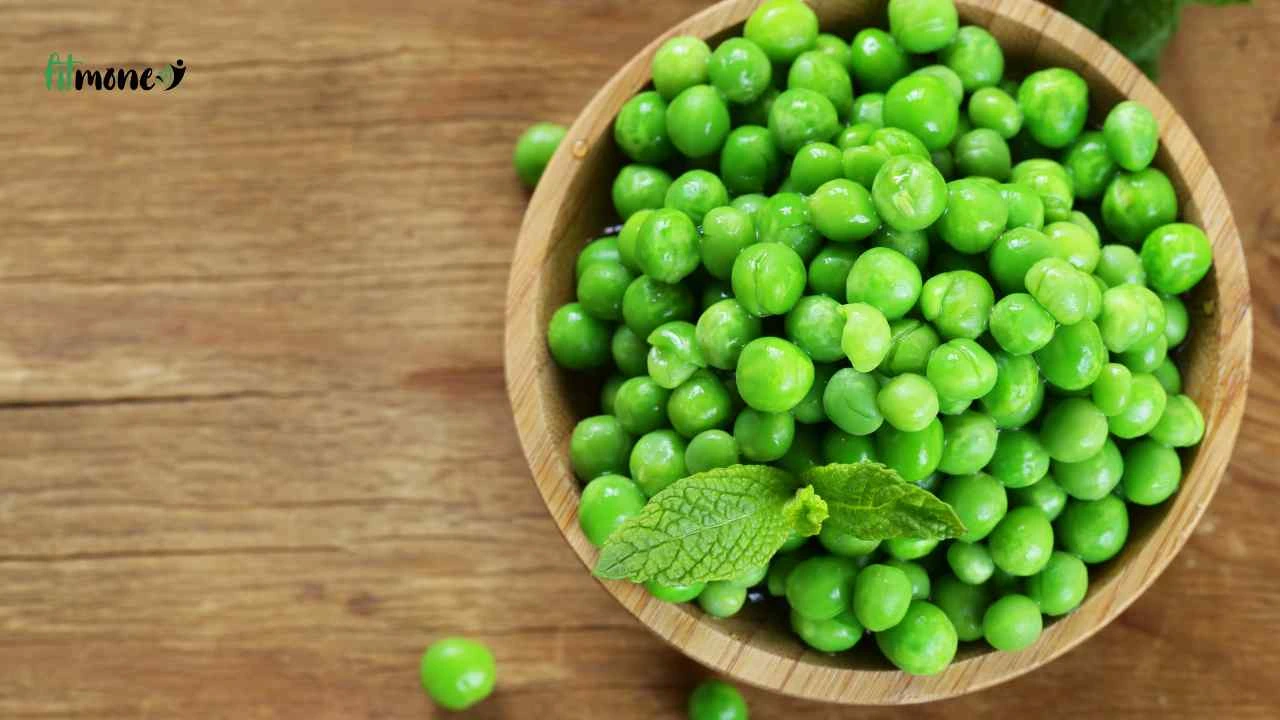
Green peas are one of those rare vegetables that are not only protein rich foods but also a complete source of protein.
Complete Protein has all the nine essential amino acids. Green Peas is a prime choice for vegan protein powders. Peas and whey contain similar amounts of proteins.
One cup of green peas will give you 8 grams of quality protein and 7 grams of fibre.
It may also help to reduce your blood sugar levels. Ayurveda says green peas are ideal for lunch due to their acidic nature. However, it can be consumed for dinner as well.
Due to their high nutritional value, green peas are sometimes considered a modest vegetable. They offer a variety of health advantages, including support for the growth of muscles.
Green peas are a great complement to a diet that aims to develop muscle because they have a significant amount of protein. Protein is necessary to preserve, grow, and repair muscles.
Protein rich foods Green peas, which are the building blocks of proteins, offer a variety of vital amino acids. The synthesis of muscle proteins and the healing of muscle tissue depend heavily on these amino acids.
Packed with complex carbs, green peas offer a steady energy supply for training and aid muscle glycogen recovery after physical activity.
Along with a balanced diet and regular exercise, adding green peas to your meals will improve your general health and aid your muscle-building endeavours.
100g of Green Peas Nutrition
| Nutrient | Amount |
| Energy | 118 Calories |
| Protein | 8 gram |
| Carbohydrates | 21 gram |
| Fat | 0.6 gram |
| Fibre | 7 gram |
6. Soy Chunks
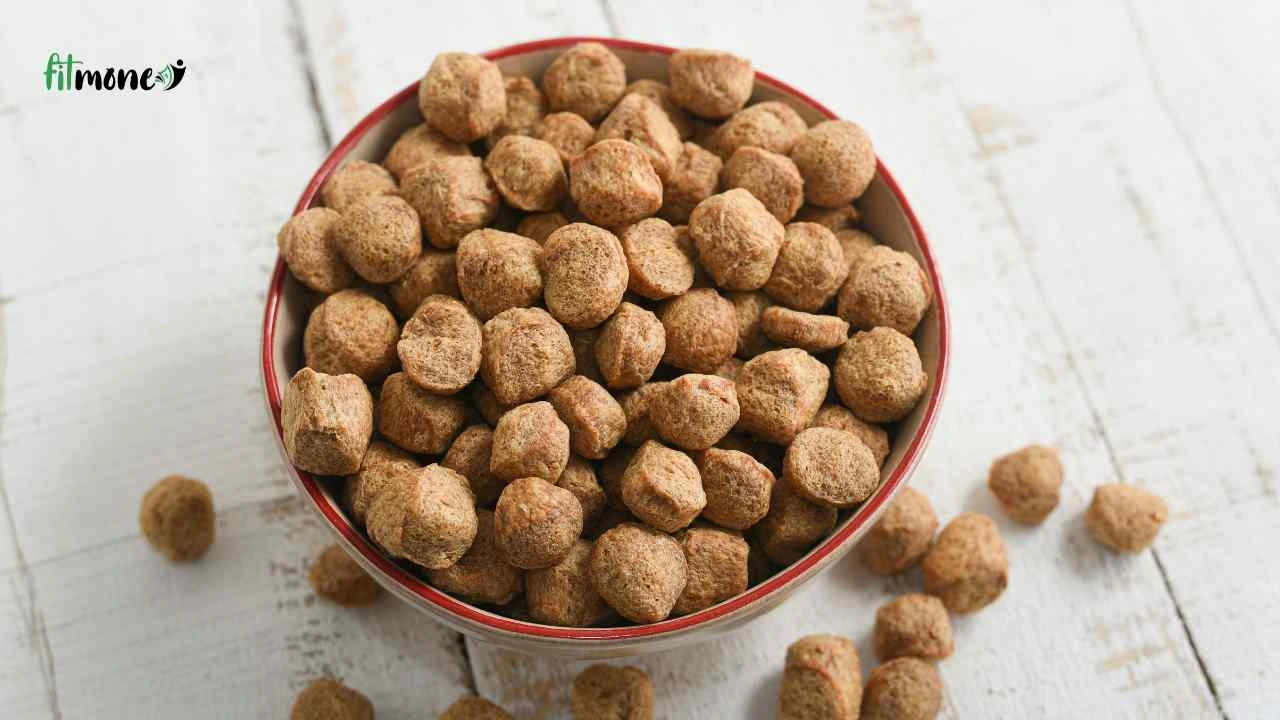
Soy chunks, or textured vegetable protein (TVP), are nutritious and one of the cheapest protein rich foods with many health benefits. Soy is a rich source of omega-3 fatty acids, proteins and polyunsaturated fats.
50 grams of Soy Chunks will give you 25 grams of Protein.
Soybean chunks are protein rich foods and provide all the essential amino acids required for muscle synthesis and repair. It makes them a good choice for vegetarians and vegans who want to meet their protein needs for muscle growth.
Soy Chunks have a balance of amino acids, including branched-chain amino acids (BCAA) such as leucine, isoleucine and valine. Branched-chain amino acids are essential for promoting muscle protein synthesis and promoting muscle growth.
Soy Chunks are generally low in fat, especially saturated fat and high in protein, which is ideal for supporting muscle growth while maintaining a low total fat intake.
Protein rich foods Soy Chunks are an excellent source of dietary fibre, which aids digestion, promotes satiety and helps control blood sugar. A healthy digestive system and stable blood sugar levels support overall health and muscle mass.
Soybean pieces contain many vitamins and minerals such as iron, calcium, phosphorus, magnesium and vitamin B12.
These nutrients are essential for energy metabolism, bone health and overall muscle function. These are naturally cholesterol-free and may benefit the heart and cardiovascular function, promoting a healthy lifestyle.
Watch video on Benefits of eating Protein rich foods Soya Chunks
Protein rich foods Soybeans contain phytochemicals such as isoflavones, which have antioxidant and anti-inflammatory properties. These compounds may promote overall muscle recovery by helping muscles recover and reducing exercise-induced inflammation.
Incorporating soy chunks into your diet can provide numerous health benefits, including muscle growth and development support, particularly for individuals following a vegetarian diet or looking for different protein sources.
You can consume 50 grams of Soy Chunks in a day. Do not consume more than 60-70 grams of soy chunks daily because it may disturb your hormonal balance, and too much of any food is bad for your health.
Check Out:
100g of uncooked Soy Chunks Nutrition
| Nutrient | Amount |
| Energy | 345 Calories |
| Protein | 52 gram |
| Carbohydrates | 33 gram |
| Fat | 0.5 gram |
| Fibre | 13 gram |
7. Peanuts
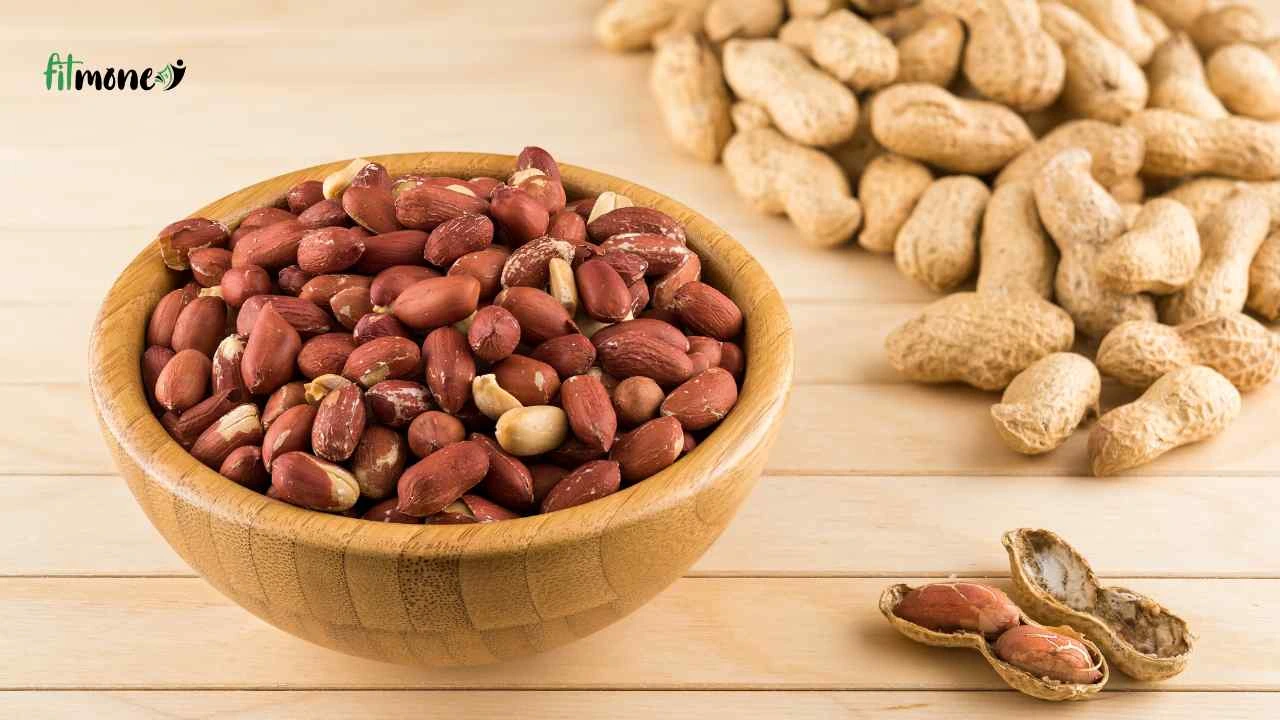
Peanuts have the highest amount of protein in the category of nuts like almonds, cashews and walnuts.
Protein rich foods Peanuts are an excellent source of protein, containing around 25% of their calories in the form of protein. It is beneficial for muscle growth, repair and overall health.
One handful of Peanuts will give you 7 grams of Protein.
Peanuts are a primary source of healthy fats. Peanuts may help you lose weight in different ways.
According to a study, when combined with weight training, peanut powder supplements may increase strength and muscle mass among adults. You can have them as a snack or can add them to recipes.
Eating peanuts in low doses may lower the risk of heart problems, but don’t go overboard with them. 15 to 20 Peanuts or two tablespoons of Peanut Butter a day are good enough to avail its benefits.
Peanuts contain many essential vitamins and minerals for overall health and muscle development, including vitamin E, niacin, folate, magnesium, phosphorus and iron. These nutrients support energy metabolism, muscle growth and recovery.
Protein rich foods Peanuts contain antioxidants, including resveratrol, flavonoids, and phenolic acids, that help reduce oxidative stress and inflammation. It promotes muscle recovery and reduces exercise fatigue caused by muscle damage.
Peanuts are a good source of dietary fibre, which supports digestion and helps with weight control. A healthy digestive system is essential for absorbing nutrients needed for muscle growth and repair.
Because peanuts are easily accessible and portable, they can be used as an easy snack to support muscle growth, even when eaten alone, at night, or in addition to meals and snacks.
Including peanuts in your diet as part of a healthy eating plan can provide many health benefits, including increased muscle mass, growth and overall health.
However, it is essential to consume them in moderation because they are energy-dense and can increase your calorie intake if eaten in excess.
Watch video on Top 5 Peanut Butters in India
Check Out:
One handful of Peanuts Nutrition
| Nutrient | Amount |
| Energy | 161 Calories |
| Protein | 7 gram |
| Carbohydrates | 4.6 gram |
| Fat | 14 gram |
| Fibre | 2.4 gram |
How much Protein to Consume daily?
The amount of protein you consume daily depends on many factors, including age, gender, weight, activity level, and overall health goals.
The recommended dietary allowance (RDA) of protein for adults is 0.8 grams per kilogram of body weight per day. However, this is a general guide and may not suit everyone.
Protein intake should be higher for physically active people who want to build muscle. Athletes or people who engage in physical activity may benefit from consuming 1.2 to 2.2 grams of protein per kilogram of body weight daily.
It is important to remember that exceeding the recommended amount of protein in the long term may lead to Health risks, especially for people with kidney disease or other health problems.
Consulting a registered dietitian or healthcare professional can help determine protein intake.
If you like the information, share it with your friends and family. Stay in touch with our blog.
Thanks for Reading.
Watch Video on Muscle Building Protein rich foods
FAQs
Q1. What food is highest in Protein?
Ans. Many foods are highest in Protein content, and you can choose from the list of veg options mentioned above, like Cottage Cheese, Milk, Peas, Lentils, soybeans, Chickpeas, etc.
Q2. How to get 100g of Protein a day?
Ans. One cup of sprouts has 7.7g of protein, 100g of roasted chickpeas has 21g of protein, 50g of soya chunks has 25g of protein, one cup of green peas has 8 g of protein, 250ml milk has 10g of protein so you can add these foods in your diet to get 100g of protein a day.
Q3. What is a good source of protein per 100g?
Ans. The foods discussed above are good protein sources and offer high-quality protein per 100g.
Q4. Is 100g of protein a day enough to build muscle?
Ans. You need 0.8g – 1g of protein per kg of body weight to maintain your muscles and health. But you must add 1.2 – 2g of protein per kg body weight for muscle building.
Q5. How can i eat a lot of protein?
Ans. You can get enough protein from different types of protein-rich foods. But if you can’t get it in enough quantities from food for muscle-building goals, you can add 1-2 scoops of whey protein.
Read More:
